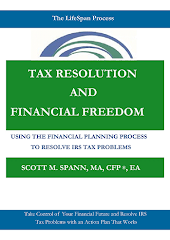I would like to take a slight detour from the traditional tax and financial planning advice that will generally appear in this blog. I will not deny that the facts, figures, statistics and supporting information related to the various aspects of our financial lives are all quite important. However, one critical area of importance that most financial planners and individuals do not typically address when dealing with tax and money matters is the “psychology of money”.
Is financial planning really all about money? I do not think so. A growing number of financial planning professionals including myself have adopted a holistic approach to the planning process. In general, this means looking at the whole person during the life planning process rather than simply focusing on their financial lives. I strongly believe that the “inner game” of money should not be ignored. It is human nature for our belief systems, attitudes, past experiences, goals and values to have an influence on key financial planning and life decisions. The traditional view towards financial matters is based on rational decision making. In reality, people do not always behave rationally when personal finances are involved.
According to the Certified Financial Planner Board of Standards Inc., more than 40 percent of Americans feel that they are not in control of their finances. Financial planning is about taking control of your finances and is often defined as the process of meeting life goals through proper management of your money. Most of us agree that it is essential to have a plan to guide us through money related decisions. Unfortunately, many people for lack of a better term get “stuck” and never truly start the planning process. That is where principles of cognitive-behavioral psychology relate directly to financial matters.
What is keeping you or someone you know from establishing or implementing a financial plan? Since most everyone will agree that a financial plan is important, the real issue is how to get started. A written plan can provide direction and guidance and reduce or eliminate money-related stress. During these uncertain economic times you can either choose to “panic” or start to “plan”.
Here are some basic tips to get started with the financial planning process if you ever find yourself “stuck”:
1. Do not wait for the right time to establish a plan. It will never happen. Set a specific date and time to review your finances and stick with it. If married, work together with your spouse and communicate openly and honestly.
2. Start with the creation of a Personal Spending Plan (a.k.a. “budget”). Tell your money where to go before the month begins rather than trying to figure out where it all went when the month ends. Use an envelope system to control spending.
3. Next, establish a plan to get out of debt. Avoid high interest consumer debt (e.g., credit cards, installment loans). Pay off your high interest consumer debt before investing.
4. Establish an emergency fund with at least 3-6 months basic living expenses. This should be completed prior to starting any long-term investment plans.
5. Once you have a fully funded emergency savings fund in place you are ready to start building wealth. Try to set aside at least 15-20% of your total income for investments. Tax advantaged retirement accounts should generally be funded first. While you may not be able to invest 15-20% of your income at first you should always use the spending plan process to save and invest as much as possible for your life planning goals.
These tips may sound very simple but they are the most important financial planning concepts to follow if you are just getting started with the planning process. Improving your financial life and using money to help reach important life planning goals is 75% behavioral and 25% knowledge and expertise. Start thinking about the psychology of money and you will be a step closer to meaningful change. The basic financial behaviors of planned spending, debt avoidance, and routine savings are the building blocks for financial freedom.
Scott M. Spann
scott@lifespanplanning.com
(843) 469-3505
Friday, April 3, 2009
Psychology of Money
Labels: tax resolution, financial plan, tax debt
financial freedom,
psychology of money
Subscribe to:
Post Comments (Atom)





No comments:
Post a Comment